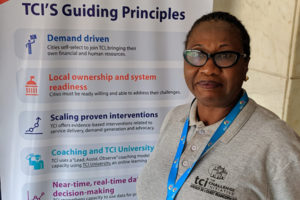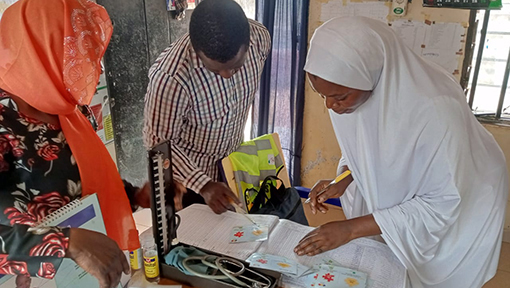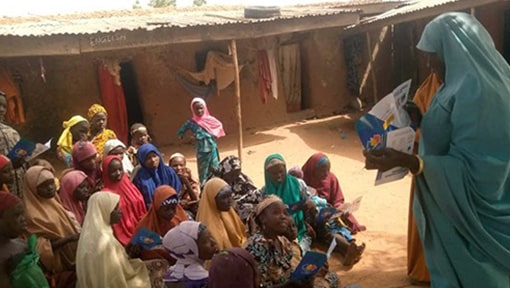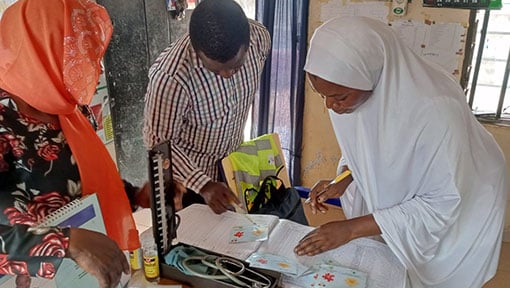Bouaké, Cote d’Ivoire, Improves Data Collection and Uses Data to Provide Services for Youth

Dr. Fatoumata Touré Bamba is the regional health director in Bouaké, Cote d’Ivoire.
Until recently, the monthly duties of Bouaké’s regional data manager included travel by motorbike to 23 district health centers to copy family planning information from handwritten registers before transferring all of the data to an Excel spreadsheet. He would then send it to The Challenge Initiative’s hub in Francophone West Africa, but it often arrived late, incomplete or not at all. This hampered TCI’s ability to understand the reality of family planning on the ground in Bouaké, a city in Cote d’Ivoire where limited evidence supported seemingly promising trends in family planning uptake. The data collation and reporting process was not sustainable for the district data manager. Given the effort required to collect and transmit the data, TCI identified a need to improve distribution of this effort across the health system as well as opportunities to use data for monitoring and decision-making.
A Right-Fit Solution
Based on a thorough mapping of the flow of information between different stakeholders and the system for data collection for family planning across the region, Mohamed Ly – TCI’s Monitoring and Evaluation Advisor in Francophone West Africa – developed and piloted a simplified, adaptable tool that has dramatically improved the timeliness and quality of project data. A key principle behind the updated tool is many hands make light work.
With the new tool, the data manager no longer has to transfer the information to the project management information system (PMIS) spreadsheet. Roles are logically dispersed across the health system and within the pre-existing cycle of information transfer between health centers and the district. Now, providers fill in paper-based forms at the facility. The data is then transferred to the district where data managers validate the PMIS data, identify missing data and follow-up with the facility to obtain additional information as needed.
To ensure rapid, accurate application of the new data collection tool, Ly traveled to each city for individualized coaching sessions with data managers across the region between October 2018 and June 2019. In a December 2018 coaching session, Bouaké’s central data manager worked with Ly to adapt the tool for his city and scale it to the district level. Beyond the efficiencies gained through this new format, the new tool has increased the reliability of the data. When the data is entered, the tool automatically generates a simple graph, which can then be used for decision-making at the district level.
Using Data to Make a Difference for Bouaké’s Youth
TCI’s Francophone West Africa hub now receives project data monthly with minimal delays from Bouaké, a popular city for youth migrants from across the region who seek educational opportunities. In a 2018 meeting of Bouaké’s informal working group, key stakeholders reviewed the data and noticed a low representation of youth among those who accepted family planning as a result of the universal referral approach. Universal referral is a TCI high-impact approach that builds provider capacity for a mini-counselling session before offering a family planning method to every person visiting the center. This approach has been at the heart of TCI’s efforts in the region to date.
The dialogue that ensued revealed that the universal referral approach had been implemented mainly in facilities identified as maternal health service delivery points in Bouaké, and therefore missed an opportunity to reach youth who were not yet parents. Given the national campaign currently working to prevent pregnancies among school-age youth, the Regional Health Director, Dr. Fatoumata Touré Bamba, acted quickly. As a result of this simple, actionable, stakeholder-driven inquiry and analysis, Dr. Bamba and her team decided to implement the universal referral approach at three school and university health centers in Bouaké. As evidenced in the graphic below, within three short months (January – March 2019), these facilities recruited 238 new youth users of modern family planning methods.

The blue line represents the recruitment of youth (15-24) from April 2017 to March 2018, before TCI. The red line shows recruitment of youth in Bouaké from April 2018 to March 2019. Since December 2018, 238 youth have accepted a modern family planning method.
The data collection tool along with coaching of data managers rolled out across TCI’s implementing cities in Francophone West Africa. Armed with near-time, fine-tuned data for decision-making, a cadre of trained data managers, and engaged steering committees, cities across the region are now poised to reach more women and youth with family planning.






